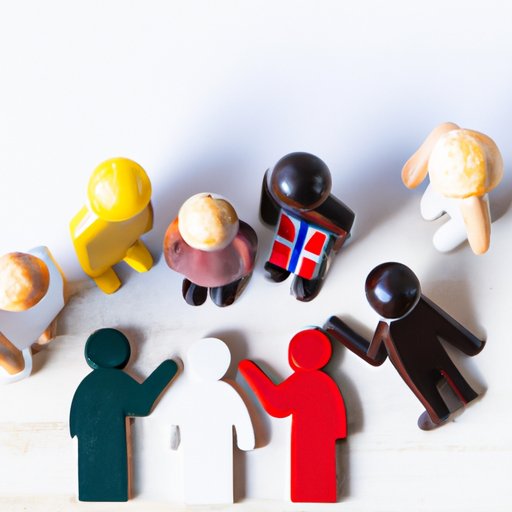Introduction
A mixed culture is defined as a combination of two or more distinct cultures. This can refer to any type of culture, such as a national culture, an ethnic culture, or even a subculture. In today’s increasingly globalized world, mixed cultures are becoming more common, as people migrate and interact with one another across borders and cultures. The result is a vibrant and diverse mixture of customs, languages, beliefs, and values.
Mixed cultures present both challenges and benefits. On one hand, there can be prejudice, discrimination, and misunderstandings due to differences in language, values, and beliefs. On the other hand, there can also be a greater appreciation for different cultures and increased creativity and innovation as people from different backgrounds come together and share their ideas.
A Historical Perspective on Mixed Cultures
Mixed cultures have been around for centuries, as people have migrated and interacted with one another. Migration has played a major role in shaping mixed cultures historically, as people have moved to new countries and brought their own unique customs and traditions with them. From the early settlers of America to the influx of immigrants in Europe and beyond, migration has continually reshaped the cultural landscape of various countries and regions.
Colonization has also had an impact on mixed cultures. When colonizers arrived in a new land, they often imposed their own language, religion, and values on the native population. This created a situation in which two distinct cultures were forced to coexist, leading to a mix of traditions and beliefs that still exists today in many parts of the world.

Exploring the Benefits of a Mixed Culture
One of the main benefits of a mixed culture is the opportunity for cultural exchange and appreciation. People from different cultures can learn about one another’s customs and traditions, which can lead to greater understanding and tolerance. This kind of cultural exchange can also foster creativity and innovation, as individuals from different backgrounds come together to share their ideas and create something new.
In addition, mixed cultures can also lead to improved interpersonal relationships. People from different backgrounds can come together and learn to appreciate one another’s differences, which can help break down barriers between individuals and create stronger bonds.

Examining Challenges Faced by Mixed Cultures
Despite the potential benefits of a mixed culture, there are also challenges that must be faced. Prejudice and discrimination can arise due to differences in language, values, and beliefs. Language barriers can also make it difficult for people from different cultures to communicate effectively. Finally, there can be conflicts in values as people from different cultures attempt to live together harmoniously.
Exploring Different Types of Mixed Cultures
There are several different types of mixed cultures. Immigration-based cultures are those that are formed when individuals from different countries migrate to a new location. Intermarriage-based cultures are those that are formed when individuals from different cultures marry one another. Finally, multi-ethnic societies are those in which multiple ethnicities coexist in the same area.

How to Celebrate and Embrace Mixed Cultures
In order to celebrate and embrace mixed cultures, it is important to understand cultural differences and respect them. Encouraging cross-cultural dialogue can help people from different backgrounds come together and learn from one another. Finally, promoting respect for all cultures is key to creating a harmonious environment in which everyone feels welcome and appreciated.
Conclusion
Mixed cultures are becoming increasingly common in today’s globalized world. While there can be challenges associated with living in a mixed culture, there are also many benefits, such as increased cultural exchange, creativity, and improved interpersonal relationships. By understanding cultural differences, encouraging dialogue, and promoting respect, we can celebrate and embrace the diversity of mixed cultures.
(Note: Is this article not meeting your expectations? Do you have knowledge or insights to share? Unlock new opportunities and expand your reach by joining our authors team. Click Registration to join us and share your expertise with our readers.)
